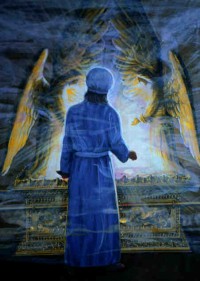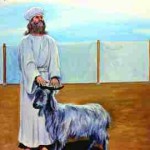 What happened to Jesus our High Priest after He died, but before He rose from the dead? Where did He go for three days? What did He do? Was He just sitting in heaven (or hell) twiddling His thumbs and checking His watch while the hours ticked by until He could rise?
What happened to Jesus our High Priest after He died, but before He rose from the dead? Where did He go for three days? What did He do? Was He just sitting in heaven (or hell) twiddling His thumbs and checking His watch while the hours ticked by until He could rise?
Jesus our High Priest (Leviticus 16; Hebrews 9)
No. I believe Jesus our High Priest was retracing the steps of the High Priest on the Day of Atonement as recorded in Leviticus 16.
The author of Hebrews writes that the actions of the priest on the Day of Atonement are followed by Jesus in His death, resurrection, and future return (Hebrews 9:24-28).
The High Priest Entered the Tabernacle
First, the tabernacle that Jesus our High Priest entered was not the earthly tabernacle, but a heavenly one (Hebrews 9:24). As such, it was a better tabernacle which required both a better priest and a better sacrifice. Jesus acted as both.
The High Priest Changed Garments
Second, before any sacrifice was made, the High Priest removed his beautiful and ornate garments that he normally wore, and put on simple, plain linens. This represents Jesus putting aside His divinity to become human.
The Activities of the High Priest
Finally, there were three primary activities of the High Priest on the Day of Atonement:
- Making sacrifices,
- Offering blood on the mercy seat in God’s presence,
- Appearing before the people who were waiting outside the tabernacle.
The various sacrifices at the altar represent the death of Jesus our High Priest on the cross.
- Offering His blood in the presence of God symbolizes what Jesus did during His three days in the grave.
- His resurrection was like the appearance of the High Priest after the offerings were complete, proving that the sacrifice had been accepted by God.
- Hebrews 9:28 indicates that we are waiting for a second appearance as well, when He will come apart from sin.
The High Priest Appeared Before the People
It might be dangerous to read too much into the details of the steps of the High Priest in Leviticus 16, but it seems that he also appeared twice to the people. The steps of the High Priest are as follows, with a short description of how the steps of the High Priest on the Day of Atonement were fulfilled in Jesus Christ through His crucifixion, burial, and resurrection.
- The High Priest takes off robes, and puts on linen clothes (Lev 16:3-4). Jesus emptied Himself of His divinity, and became human (Php 2:7-8).
- The High Priest kills a bull as a sin offering for himself (Lev 16:11). This activity—and the following four activities—were accomplished by Jesus on the cross and during His three days in the tomb. All of these are done alone, without any other person present in the tabernacle (Lev 16:17).
- The High Priest takes blood from the bull into the Holy of Holies and sprinkles it on the Mercy Seat (Lev 16:12-14).
- The High Priest exits the Holy of Holies, and kills the goat as a sin offering for the people (Lev 16:15).
- The High Priest takes blood from the goat back into the Holy of Holies and sprinkles it on the Mercy Seat (Lev 16:15).
- The High Priest exits the Holy of Holies, and sprinkles blood from both the bull and the goat on the altar to purify it (Lev 16:18-19).
- When these steps are complete, the High Priest returns to the people waiting outside (Lev 16:20-21). While some think that this appearance represents the resurrection of Jesus, this does not fit the events well, since all of the sacrifices for the Day of Atonement are not yet complete. He still has to send the scapegoat out of the city. Therefore, it seems possible that this appearance of Jesus might be His appearance to another group of people who were also waiting for the once-for-all sacrifice to be completed, namely, those who believed in the coming Messiah, but who died before His death and resurrection. It is they, apparently, who were possibly in “Abraham’s Bosom” (cf. Luke 16:19-31). Though they were not technically in hell, the final sacrifice for their sins had not yet been made, and so they could not go to God. So maybe Jesus appeared to them, preached to them, and took them with Him at His resurrection (cf. 1 Peter 3:18-20; 4:6; Matt 27:52-53; Eph 4:8).
- The High Priest now lays the sins of the people on the second goat, and the goat is led out of the city and into the wilderness (Lev 16:21-22). While this could represent how Jesus was led out of Jerusalem to be crucified, it may also reveal what Jesus did with the sin of the world that was laid upon Him. If He went to Hades, which is a place away from the tabernacle, outside the camp, then maybe He left sin there. He took sin upon Him on the cross, and then carried it to where it goes—Death and Hades—and left it there. He was the only one able to escape death because He Himself did not sin.
- After the scapegoat is released, the High Priest enters into the Tabernacle one more time, takes off his linen clothes, and puts back on his glorious clothes (Lev 16:23-24). This represents the resurrection of Jesus, and His return to His place at the right hand of God the Father in heaven.
- The remains of the bull and goat that were sacrificed are now carried outside the camp, and they are completely burned up (Lev 16:27). Again, if these sacrifices represent Jesus then it may be true that in some sense, Jesus descended into hell with the sin that He took upon Himself.
What do you think? The author of Hebrews shows that there are some parallels in Hebrews 9, but do you have anything to add?
The cross of Jesus is CENTRAL to everything!
Transform your life and theology by focusing on the crucifixion and resurrection of Jesus:
Fill out the form below to receive several emails from me about the death and resurrection of Jesus.
(Note: If you are a member of RedeemingGod.com, login and then revisit this page to update your membership.)



